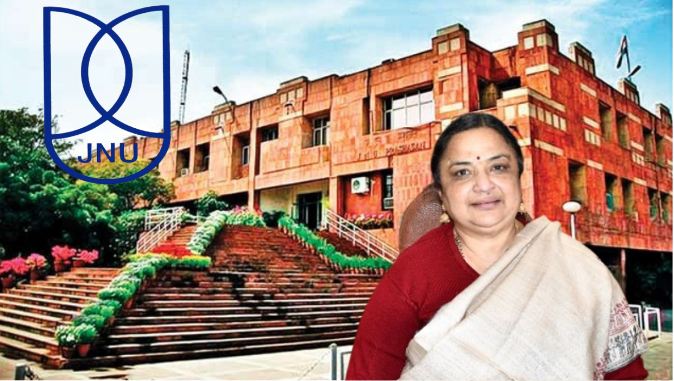Ever since the nationalist government of Prime Minister Narendra Modi came to power at the centre, JNU (Jawaharlal Nehru University) ragtag team of Marxists, socialists, communists and anti-national elements have felt threatened. These raucous elements had maintained the status quo for a long time and covertly worked in the shadows to indoctrinate the students.
However, after 2014, they crawled out of their highly subsidized hostel rooms and staff rooms, feeling threatened that the BJP government may break the ecosystem.
The tukde-tukde gang was the progeny of JNU and soon the country got to know the bogeys that the university had spawned in its midst over decades of faulty supervision. However, all that is now changing. JNU is finally becoming the educational institute it was destined to be. An institute that gave us the likes of Nirmala Sitharaman, S Jaishankar, and not Kanhaiya Kumar.
The changing ground reality
According to sources on the ground, entry to the JNU compounds has now been regulated. Earlier, anyone could barge into the university without minimal check, and this led to a load of troubles. The new Vice-Chancellor in Dr Santishree Dhulipudi Pandit has clocked the changes to make the university feels more like a university rather than a transit terminal, where anybody could come for a leisurely walk.
Moreover, there are murmurs that Dr Pandit may crackdown on the “Dhaba culture” of the university which has been the breeding ground of JNU’s toxic and highly volatile ideas.
However, the biggest change ushered by the new administration is the introduction of entrance exams. Following the change in Delhi University’s admission system, JNU admissions for 2022 would also be done through Common Universities Entrance Test (CUCET).
The University has itself announced the big decision and has said that the entrance examination would be held as and when planned by the National Testing Agency (NTA). This one move completely dispenses with the old ecosystem that had made JNU a hub of leftist ideology.
How does the admission system retain the leftist stronghold?
The faculty of an institute drives its reputation and thinking process. Domination of Marxist ideology thus helped the University become a centre of leftist ideology. But this ideology would have waned out had diverse students made it to the University in large numbers.
However, in its initial years, JNU had a system of interviews for selecting students. The professors interviewed candidates and selected students. When the faculty itself professed and propagated leftist thought, it was only natural that they preferred leftist minds over others.
Read More: JNU’s new admission strategy will destroy India’s last leftist bastion for good
The system was, however, criticised and opposed vehemently. So, in the early 1980s, the University decided to conduct written tests in different parts of the country, giving students in rural and backward areas to compete on equal footing with students coming from urban areas.
However, subjective tests alone do not achieve objectivity in admissions. After all, it was the faculty that conducted and evaluated written tests. From the descriptive answers themselves, one can judge the mindset and ideology of the candidate, just like an editorial or an op-ed reveals the ideology of the author. Then, the evaluator could filter the appearing candidates according to their ideology.
Changing curriculum of the university
Moreover, the curriculum is also being changed to make the students capable of differentiating from black and white. As reported by TFI, upon the approval of the academic council, the University last year introduced an elective course on counter-terrorism for engineering students pursuing a dual degree programme.
The course states that “Jihadi terrorism” is the only form of “fundamentalist-religious terrorism”, and that they have been historically supported by countries with a communist background, such as China and the Soviet Union.
Despite the opposition from parties like CPI and TMC, the University remained resolute in introducing the elective course.
An unapologetic Vice-Chancellor
Earlier this month, the Ministry of Education appointed Dr Santishree Dhulipudi Pandit as the Vice-Chancellor of the university, replacing M Jagdesh Kumar.
After Dr Pandit’s appointment was made public, tweets from an unverified account with her name started floating on the internet. The Netizens began trolling her for the same. The Twitter handle was deleted after this incident. The backlash Dr Pandit faced could be linked to her nationalistic values for which she stands unapologetically.
She had been a vocal critic of how India’s history has been painted. In a webinar organized by the Political Science Department of Shri Venkateshwara college Pandit criticized the incorrect narrative of Indian History that has been taught to the Indians for decades.
She claimed that the NCERT textbooks have been teaching a painted image of not only the ‘Mughals’ but also the ‘Nehru Gandhi Dynasty’.
She also went on to openly criticize the whitewashing of the history of ‘Islamic Invasions’ on India. She did not dodge from speaking about how the sacrifices made by the Indian revolutionaries have been obliterated to build a narrative that the Indian National Movement was a peaceful non-violent movement.
Read More: Meet SantishreeDhulipudi Pandit, JNU’s first female and Nationalist VC
The last decade has been a blot on the image of JNU. It has only made headlines for spearheading issues of separatism, secessionism, and terrorism. The university only created ideological soldiers who thought completing PhDs in African Studies was the only way to contribute to society. However, all that is now changing and changing for good.
